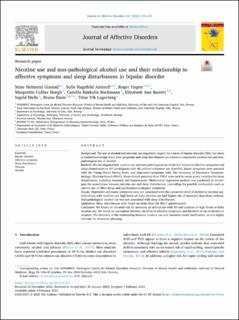| dc.contributor.author | Glastad, Stine Holmstul | |
| dc.contributor.author | Aminoff, Sofie Ragnhild | |
| dc.contributor.author | Hagen, Roger | |
| dc.contributor.author | Høegh, Margrethe Collier | |
| dc.contributor.author | Büchmann, Camilla Bakkalia | |
| dc.contributor.author | Barrett, Elizabeth Ann | |
| dc.contributor.author | Melle, Ingrid | |
| dc.contributor.author | Etain, Bruno | |
| dc.contributor.author | Lagerberg, Trine Vik | |
| dc.date.accessioned | 2023-08-29T10:40:36Z | |
| dc.date.available | 2023-08-29T10:40:36Z | |
| dc.date.created | 2023-02-25T15:35:23Z | |
| dc.date.issued | 2023 | |
| dc.identifier.citation | Journal of Affective Disorders. 2023, 327 236-243. | en_US |
| dc.identifier.issn | 0165-0327 | |
| dc.identifier.uri | https://hdl.handle.net/11250/3086163 | |
| dc.description.abstract | Background
The use of alcohol and nicotine can negatively impact the course of bipolar disorder (BD), but there is limited knowledge about how symptoms and sleep disturbances are related to concurrent nicotine use and non-pathological use of alcohol.
Methods
We investigated how nicotine use and non-pathological use of alcohol relates to affective symptoms and sleep disturbances in 453 participants with BD without substance use disorders. Manic symptoms were assessed with the Young Mania Rating Scale, and depressive symptoms with The Inventory of Depressive Symptomatology, Clinician-Rated (IDS-C). Sleep-related questions from IDS-C were used to create proxy variables for sleep disturbances, including Insomnia and Hypersomnia. Multinomial regression analysis was conducted to investigate the associations between nicotine use and sleep disturbances, controlling for possible confounders such as current use of illicit drugs and psychopharmacological treatment.
Results
Depressive and manic symptoms were not associated with the concurrent level of alcohol or nicotine use. Individuals with medium and high levels of daily nicotine use had higher risk of insomnia than those without. Non-pathological alcohol use was not associated with sleep disturbances.
Limitations
Sleep disturbances were based on items from the IDS-C questionnaire.
Conclusion
We found an elevated risk for insomnia in individuals with BD and medium or high levels of daily nicotine use. We found no association between the level of affective symptoms and the level of use of alcohol or nicotine. The direction of the relationship between nicotine use and insomnia needs clarification, as it is highly relevant for treatment planning. | en_US |
| dc.language.iso | eng | en_US |
| dc.publisher | Elsevier | en_US |
| dc.rights | Navngivelse 4.0 Internasjonal | * |
| dc.rights.uri | http://creativecommons.org/licenses/by/4.0/deed.no | * |
| dc.title | Nicotine use and non-pathological alcohol use and their relationship to affective symptoms and sleep disturbances in bipolar disorder | en_US |
| dc.title.alternative | Nicotine use and non-pathological alcohol use and their relationship to affective symptoms and sleep disturbances in bipolar disorder | en_US |
| dc.type | Peer reviewed | en_US |
| dc.type | Journal article | en_US |
| dc.description.version | publishedVersion | en_US |
| dc.source.pagenumber | 236-243 | en_US |
| dc.source.volume | 327 | en_US |
| dc.source.journal | Journal of Affective Disorders | en_US |
| dc.identifier.doi | 10.1016/j.jad.2023.02.003 | |
| dc.identifier.cristin | 2129223 | |
| cristin.ispublished | true | |
| cristin.fulltext | original | |
| cristin.qualitycode | 1 | |

